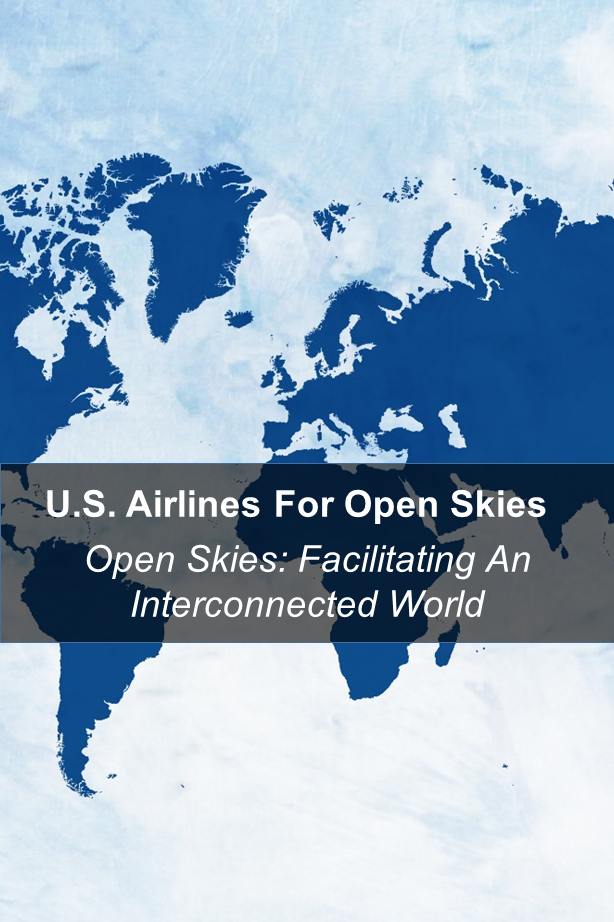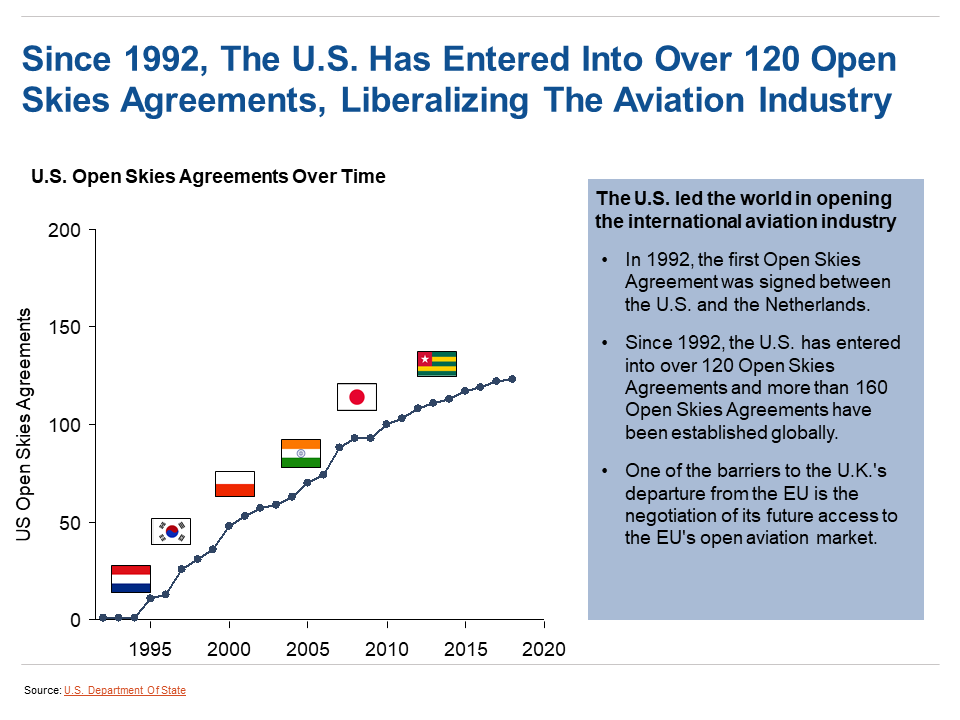About The Issue
What Are Open Skies Agreements?
They are agreements between the United States and other countries that create open, competitive markets for international air travel. They enable airlines, not governments, to make decisions about routes, capacity, frequency, and pricing of their services, based on market demand. Open Skies agreements promote competition in the aviation sector, increase choice, and reduce costs for consumers while also facilitating exports for U.S. businesses and enhancing U.S. national security. Since 1992 the United States has entered into more than 100 Open Skies agreements with countries ranging from Germany and Singapore to Chile and Uganda. For a full list of the United States’ Open Skies agreements, click here.
Why Are They Important?
More than 100 U.S. Open Skies agreements have brought millions of new international visitors to the United States, supporting more than 15 million U.S. tourism and hospitality jobs. According to the U.S. Travel Association, 75 million international visitors spent nearly $250 billion in the United States in 2016 alone, benefiting a wide array of travel-related businesses such as hotels, rental car companies, restaurants, and retailers. In fact, adding one daily wide-body flight carrying predominantly foreign-originating tourists can result in $65 million in direct spending, $117 million in U.S. GDP growth, and more than 1,150 U.S. jobs.
Open Skies agreements save passengers $4 billion on U.S.-international routes annually and have created more choices by expanding domestic airline routes. Furthermore, the United States’ network of Open Skies agreements has bolstered U.S. national security by enabling carriers to transport U.S. military equipment and troops to and from hot zones.
Open Skies & the Response to COVID-19
Open Skies agreements played a critical role in America’s response to the COVID-19 crisis. Without these agreements already in place, airlines – particularly all-cargo carriers – would not have had the flexibility that they needed to move critical medicine, supplies, and consumer goods around the world to where they were most needed.
-
-
- Pharmaceuticals – Americans did not experience COVID-19-related shortages of necessary drugs, from fever-reducing drugs like acetaminophen to drugs like insulin that many Americans depend on each day. Open Skies agreements allowed cargo carriers to quickly ship these vital drugs from their country of manufacture to the United States without delay.
- Medical Supplies – from the beginning of the crisis, Open Skies agreements allowed all-cargo carriers to shift capacity to where it was most needed without renegotiating overflight and landing rights in each instance. As COVID-19 moved across the globe, cargo airlines were able to meet changing demand on a day-to-day basis.
-
For instance, cargo carriers partnered with health care companies to expedite shipments of necessary supplies to designated testing facilities increase COVID-19 detection capacity.
-
-
- Household Delivery of Critical Supplies & Household Goods – the ability to deliver supplies and household goods directly to doorsteps played a critical role in minimizing personal contacts. The global logistics network that enabled the fast, efficient, and inexpensive delivery of goods to Americans’ homes is built on Open Skies agreements.
-
International air cargo, whose networks are predicated on America’s 130 Open Skies agreements, is one of the fastest and safest means of moving important goods around the globe while minimizing the risk of transmission of the COVID-19 virus. Open Skies agreements were essential to the ability of governments, health care providers, and everyday citizens to respond to changing conditions throughout the country.
Just The Facts
Economic Benefits Of Open Skies Agreements
National Security Benefits Of Open Skies Agreements
Open Skies allows U.S. airlines to maintain global delivery networks to transport troops and vital supplies for the U.S. military. Since 1991, commercial carriers have transported almost 40% of the equipment, supplies, and food to support operations in Iraq, Afghanistan, and the Persian Gulf and more than 90% of U.S. forces to and from Iraq.
U.S. Airline Benefits Of Open Skies Agreement
- Under U.S. open skies agreements U.S. carriers have been able to establish new routes:
- JetBlue Airways now provides service under Open Skies agreements with Colombia and Jamaica
- JetBlue Airways also was able to initiate service between Boston and Detroit, a route that was previously served by only one carrier, due to the number of international passengers arriving in Boston thanks to Open Skies.
Who We Are
U.S. Airlines for Open Skies (USAOS) is a coalition of four U.S. passenger and cargo carriers – Atlas Air Worldwide, FedEx, JetBlue Airways, and Cargo Airline Association – in support of the United States’ Open Skies agreements, which promote U.S. jobs and economic growth. Collectively, USAOS members transport approximately 54 million passengers annually, ship nearly 8 million tons of cargo, and employ approximately 1,345,000 people.








